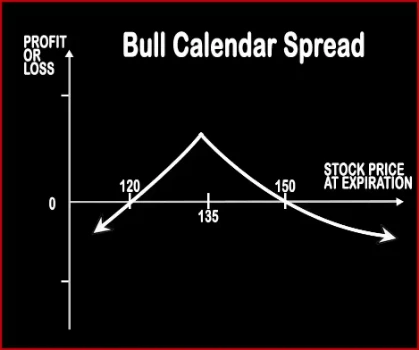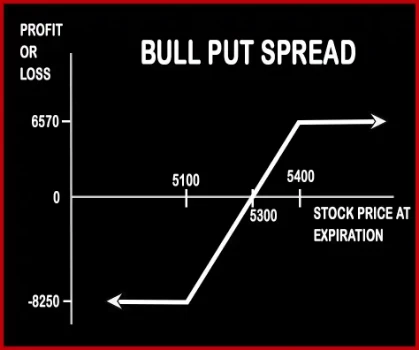Compare Strategies
| BULL CALENDER SPREAD | BULL PUT SPREAD | |
|---|---|---|

|

|
|
| About Strategy |
Bull Calendar Spread Option StrategyThis strategy is implemented when a trader is bullish on the underlying stock/index in the short term say 2 months or so. A trader will write one Near Month OTM Call Option and buy one next Month OTM Call Option, thereby reducing the cost of purchase, with the same strike price of the same underlying asset. This strategy is used when a trader wants to make prof |
Bull Put Spread Option StrategyBull Put Spread option trading strategy is used by a trader who is bullish in nature and expects the underlying asset to move in an upward trend in the near future. This strategy includes buying of an ‘Out of the Money’ Put Option and selling of ‘In the Money’ Put Option of the same underlying asset and the same expiration date. When you write a Put, you will receive prem .. |
BULL CALENDER SPREAD Vs BULL PUT SPREAD - Details
| BULL CALENDER SPREAD | BULL PUT SPREAD | |
|---|---|---|
| Market View | Bullish | Bullish |
| Type (CE/PE) | CE (Call Option) + PE (Put Option) | PE (Put Option) |
| Number Of Positions | 2 | 2 |
| Strategy Level | Beginners | Advance |
| Reward Profile | Unlimited | Limited |
| Risk Profile | Limited | Limited |
| Breakeven Point | Stock Price when long call value is equal to net debit. | Strike price of short put - net premium paid |
BULL CALENDER SPREAD Vs BULL PUT SPREAD - When & How to use ?
| BULL CALENDER SPREAD | BULL PUT SPREAD | |
|---|---|---|
| Market View | Bullish | Bullish |
| When to use? | This strategy is used when a trader wants to make profit from a steady increase in the stock price over a short period of time. | Bull Put Spread strategy is used when you're of the view that the price of a particular underlying will rise, move sideways, or marginally fall. |
| Action | Sell 1 Near-Term OTM Call, Buy 1 Long-Term OTM Call | Buy OTM Put Option, Sell ITM Put Option |
| Breakeven Point | Stock Price when long call value is equal to net debit. | Strike price of short put - net premium paid |
BULL CALENDER SPREAD Vs BULL PUT SPREAD - Risk & Reward
| BULL CALENDER SPREAD | BULL PUT SPREAD | |
|---|---|---|
| Maximum Profit Scenario | You have unlimited profit potential to the upside. | Max Profit = Net Premium Received |
| Maximum Loss Scenario | Max Loss = Premium Paid + Commissions Paid | Max Loss = (Strike Price Put 1 - Strike Price of Put 2) - Net Premium Received |
| Risk | Limited | Limited |
| Reward | Unlimited | Limited |
BULL CALENDER SPREAD Vs BULL PUT SPREAD - Strategy Pros & Cons
| BULL CALENDER SPREAD | BULL PUT SPREAD | |
|---|---|---|
| Similar Strategies | The Collar, Bull Put Spread | Bull Call Spread, Bear Put Spread, Collar |
| Disadvantage | • Limited profit even if underlying asset rallies. • If the short call options are assigned when the underlying asset rallies then losses can be sustained. | • Limited profit potential. • In loss situations, time decay may go against you. |
| Advantages | • Limited losses to the net debit. • Enable trader to book profit even if underlying asset stays stagnant. • If the market trends reverse, cashing in from stock price movement at limited risk. | • Benefit from the time decay in profit positions but harmful in loss positions. • Profitable when underlying stock price rises, move sideways or marginal drop. • Reduce the downside risk. |